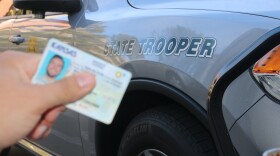Two-thirds of registered Texas voters have a favorable opinion of the state’s voter photo ID law, and more than half have a “very favorable” view, according to the latest University of Texas/Texas Tribune Poll.
Jim Henson is the co-director of the poll, and head of the Texas Politics Project at the University of Texas at Austin. He says, “Voter ID is now seen completely through a partisan lens. People then match their expectation of the facts to their predispositions.”
The law is in use for the current election.
Only 22 percent say they have an unfavorable opinion of that law.
The law is being challenged in the courts. A federal judge in Corpus Christi ruled this month the law is unconstitutional, a finding the state is appealing to a higher court.
“I think people are overthinking this,” says Daron Shaw, a government professor at UT-Austin and co-director of the poll. “It cuts blacks in half — a core Democratic constituency. And Hispanics are for it. What Republican wouldn’t go for that? It’s just a wedge issue.”
Other survey findings:
- Texans overwhelmingly support the deployment of National Guard troops to the Texas border after increases in the numbers of unaccompanied minors from Central America appearing there. Almost three in four support the deployment — 44 percent of them “strongly support” it — and only 22 percent say they oppose it.
- 60 percent of Texans agree that undocumented immigrants living in the U.S. should be immediately deported. And 52 percent say the illegal immigrants who have lived in the state for at least a year and graduated from Texas high schools should pay higher, out-of-state tuition rates.
- Slightly more than half of registered voters disagree with the statement that “this country would be better off if we just stayed home and did not concern ourselves with problems in other parts of the world.” But 43 percent agree.
- Forty-two percent say Gov. Rick Perry is innocent of the crimes he was accused of committing in indictments issued earlier this year, while 31 percent say he’s guilty and 22 percent say it is too soon to tell.
- The Tea Party accounts for slightly more than half of the state’s Republicans. Asked whether they would vote for a Democrat or a Republican in a race for Congress, likely voters split 53 percent to 40 percent in favor of the Republicans.
The details of how these percentages break down by ethnicity and political party are available from The Texas Tribune.







